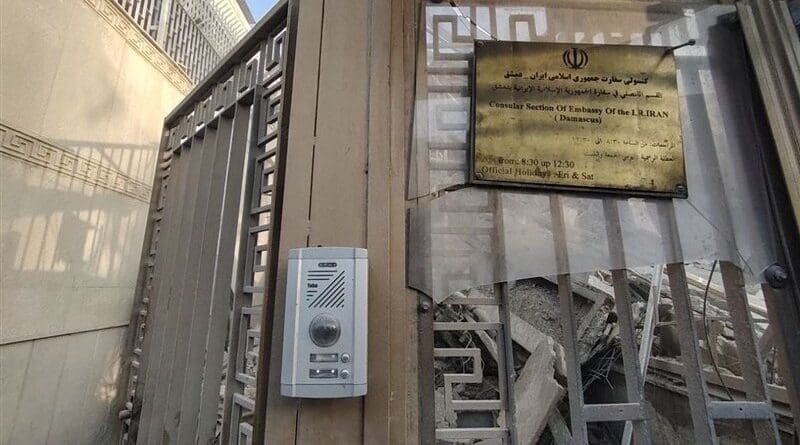Israel’s Provocative Attack On Iranian Consulate: A Dangerous Escalation In Middle East – OpEd
By Altaf Moti
Israel’s recent actions in the Middle East particularly the strike on the Iranian consulate in Damascus have raised significant concerns and drawn condemnation for their aggressive and provocative nature. The attack resulting in the deaths of several Iranian military officials, including Gen. Mohammad Reza Zahedi, has been viewed as a violation of international norms and a dangerous escalation of tensions in the region.
The strike took place shortly before a secure video conference call between top Israeli officials and U.S. National Security Adviser Jake Sullivan and Secretary of State Blinken to discuss alternatives to an Israeli ground invasion in Rafah, but the air strike in Syria did not come up during the two-and-a-half-hour meeting.
Israel’s role in the recent events has been characterized by a series of aggressive moves including targeted strikes on Iranian officials and diplomatic facilities which have been perceived as provocative and destabilizing. The attack on the Iranian consulate, a diplomatic facility, has been particularly contentious, as consulates are considered extensions of national territory under international law, making the strike a direct assault on Iranian soil.
Furthermore, Israel’s actions have been seen as a deliberate attempt to provoke Iran and escalate the conflict with the potential to trigger a wider regional war. By targeting high-ranking Iranian officials and engaging in aggressive military operations, Israel has demonstrated a willingness to take risky actions that could have far-reaching consequences.
Netanyahu’s decision to attack the Iranian Consulate is a clear signal that he is not willing to wait for diplomatic efforts to bear fruit. The Israeli government believes that Iran is using the consulate as a cover for its intelligence operations and that the attack was a necessary measure to protect Israel’s national security.
The strike on the Iranian consulate, coupled with Israel’s history of military interventions in the region and support for militant groups, has underscored the country’s role as a key player in the complex web of Middle Eastern geopolitics. Israel’s actions have been met with criticism and concern from the international community with calls for restraint and de-escalation to prevent further violence and instability in the region.
The Iranian Response
Iran has responded to the attack on its consulate with threats of retaliation and vows to make Israel regret its actions. The Iranian government, faced with the challenge of balancing the imperative to retaliate with the need to avoid a full-scale conflict, is carefully weighing its options to navigate this delicate situation. The threat of retaliation looms large with Iran vowing to uphold its national honor and security interests.
The international community, led by the United States, has urged restraint and called for all parties to exercise caution and avoid further escalation. The U.S. has denied involvement in the attack but the situation remains tense with the potential for further violence and instability in the region.
The Broader Context
The attack on the Iranian consulate is just the latest chapter in a long-standing conflict between Iran and Israel, with roots in the 1979 Iranian Revolution and the subsequent severing of diplomatic and commercial ties between the two countries. The conflict has played out in various ways, including through support for opposing factions in conflicts in Syria and Yemen, and has been shaped by broader power dynamics in the Middle East, with both Iran and Israel aspiring to regional hegemony.
The recent strike on the Iranian consulate has heightened tensions and increased the risk of further escalation, with the potential to draw in other regional and global powers. The situation remains deeply uncomfortable for U.S. President Joe Biden, who is facing growing pressure from inside the Democratic Party to limit the flow of American arms to Israel and avoid entanglement in another war in the Middle East.
The attack on the Iranian consulate has also increased the risk of escalation and put U.S. troops in the region at risk, with more than 150 attacks by Iran-backed militias in Iraq and Syria on U.S. forces at bases in those countries since the war between Hamas and Israel began on October 7, 2023.
Furthermore, the attack could jeopardize the Iran nuclear deal. The deal, which was signed in 2015, is already under threat due to the Trump administration’s withdrawal from the agreement in 2018. The attack on the Iranian Consulate could further undermine the deal, making it more difficult to persuade Iran to continue complying with its obligations.
The Reversal of GPS by Israel and its Implications
In the aftermath of the attack, Israel has evacuated its embassies in several countries, fearing potential retaliatory attacks from Iran or its proxies. This decision has been described as a “slap” warning from Iran. The reversal of GPS by Israel is a significant move, as it could potentially limit Iran’s ability to launch missile strikes against Israeli targets. However, it also raises concerns about the potential for unintended consequences and the risk of escalation.
The attack on the Iranian consulate in Damascus has heightened tensions between Israel and Iran, with both countries vowing retaliation. While the nature of Iran’s response is yet to be seen, the reversal of GPS by Israel and the evacuation of Israeli embassies suggest that the conflict could escalate further. The situation calls for cautious diplomacy and de-escalatory measures, as the stakes are high for all actors involved in the volatile theatre of Middle Eastern politics.

